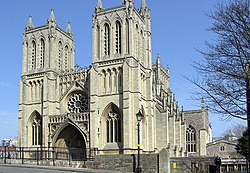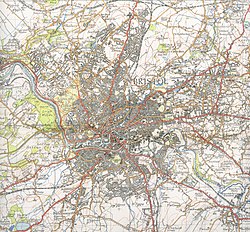Bristol
Bristol is a city and ceremonial county in England. It is home to nearly 430,000 people. The River Avon runs through it to the Severn estuary.
| City of Bristol transcription(s) | |
|---|---|
|
| |
| Sovereign state | |
| Country | |
| Region | South West |
| Royal Charter | 1155 |
| County status | 1373 |
| Status | City, county and unitary authority |
| Government | |
| • Type | Unitary authority |
| • Governing body | Bristol City Council |
| Area | |
| • City and county | 110 km2 (40 sq mi) |
| Elevation | 11 m (36 ft) |
| Population (2017) | |
| • City and county | 463,400 (Ranked 10th district and 43rd ceremonial county) |
| • Density | 3,892/km2 (10,080/sq mi) |
| • Urban | 724,000 |
| • Metro | 1,006,600 (LUZ 2,009) |
| • Ethnicity[1] |
|
| Time zone | UTC+1 (GMT (UTC)) |
| • Summer (DST) | BST |
| Postcode | BS |
| ISO 3166 code | GB-BST |
| Website | www.bristol.gov.uk |
Geography
It is between the counties of Gloucestershire and Somerset. In 1373, King Edward III ordered that it should be a county itself forever. However, it lost county status in 1974, the year after its 600-year celebrations. It became the largest district within the new Avon county. Avon was never popular and was abolished in 1996, when county status returned to Bristol, which became a unitary council.
History
Bristol comes from Old English Brycgstow meaning “bridge-place”. It was a port for 800 years, but now ships are too big to reach the centre, so it has a new port at Avonmouth.
Historical sites
It has many historic churches and other buildings. The Clifton Suspension Bridge crosses high above the river. The University of Bristol is also in Clifton.
Bristol was a centre for the slave trade.[2][3] During the 2020 George Floyd protests, a crowd pushed down the statue of 17th century slave trader Edward Colston and threw it in the harbour.[4]
Bristol was badly damaged during World War II. It now has many new factories and offices. The Concorde supersonic airliner was made here.
It is also the birthplace of the music genre trip hop,[5] with 3 trip hop bands originating there: Massive Attack, Portishead (named after a North Somerset town) and Tricky.[6]
Notable people
Some of the most notable people who are currently living, or who are from the city include:
- Banksy - graffiti artist [7][8][9]
- Stephen Merchant - writer and comedian
- Russell Howard - comedian and television presenter
- Louie Hill
Bristol Media
West front of Bristol Cathedral
An 1873 engraving showing Colston Hall, the port and cathedral of Bristol
Black-and-white etching showing the towers of St Stephen's Church, St Augustine the Less Church and Bristol Cathedral, published c. 1850
City Hall, the seat of local government
References
- ↑ "2011 Census: Ethnicgroup, local authorities in England and Wales". Census 2011. Office for National Statistics. Archived from the original on 16 January 2013. Retrieved 12 December 2012.
- ↑ "The Growing Effort to Remove Monuments of Europe's Racist Past" (in en). Time. https://time.com/5850135/edward-colston-statue-slave-trader-protests/. Retrieved 2020-06-10.
- ↑ [https:bamsh.co.uk "Bristol Business"].
{{cite web}}: Check|url=value (help) Wednesday, 1 February 2017 - ↑ Toppled statue of English slave trader to be moved to a museum. Reuters. June 10, 2020. https://www.reuters.com/article/us-minneapolis-police-protests-britain-s/toppled-statue-of-english-slave-trader-to-be-moved-to-a-museum-idUSKBN23H23K. Retrieved June 10, 2020.
- ↑ Maine, Samantha (9 February 2012). "Trip-Hop in Bristol – a brief history - 1994 rises". Archived from the original on 10 August 2020. Retrieved 15 October 2018.
- ↑ "Bristol: Facts, Discussion Forum, and Encyclopedia Article". absoluteastronomy.com. Retrieved 19 December 2010.
- ↑ "Banksy Walking Tour". Visit Bristol. Retrieved 2020-06-10.
- ↑ "Banksy". Biography. Retrieved 2020-06-10.
- ↑ CNN, By Allen Kim. "A new Banksy mural showed up just in time for Valentine's Day". CNN. Retrieved 2020-06-10.
{{cite web}}:|last=has generic name (help)
Other websites
 Media related to Bristol at Wikimedia Commons
Media related to Bristol at Wikimedia Commons













